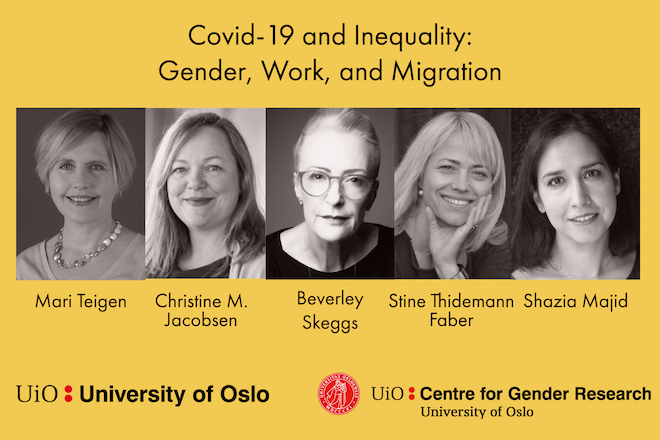Programme
14:00 Welcome and introduction by Inger Skjelsbæk, Director of Centre for Gender Research and Svein Stølen, Rector of the University of Oslo.
14:10-14:30 Keynote lecture by Beverley Skeggs, Distinguished Professor at Lancaster University and lead on Global Economies of Care at the London School of Economics:
"The Value of Death: What Covid-19 Has Taught Us about Opportunism, Inequality and Social Reproduction"
Achille Mbembe draws attention to the dark side of Western governance, how the desires, fears, affects, relations, and violence that drove colonialism, are now evidenced more generally. He calls this necropolitics. I’ll show how the legacies of colonialism which designate which lives matter are being reinvigorated and institutionalised in a political economy in which politicians and their friends reap monetary gains. Death becomes a matter of calculation factored into profitability. The responsibility for social reproduction becomes entrenched as people fight to survive. Care, is paradoxically symbolically recognised, devalued and essential. Viewing the present through colonial legacies redirects our attention enabling us to see how concepts such as surplus, disposable, superfluous and deportable are as significant as labour for understanding the current political economy. The social contract (or social compact/settlement) which once offered a form of protection is fracturing, a point even recognised by supra-state institutions such as the IMF and World Bank. The symptoms of this fracturing is evidenced in the spread of corruption, conspiracy and lack of accountability. As many of the gains for which feminists have fought for hard and long are being eroded, what do we do?
14:30-15:00: Presentations by:
- Christine M. Jacobsen - Professor at the Department of Social Anthropology, University of Bergen - "Vulnerability in Pandemic Times: The Case of Migrants with a Precarious Legal Status in France"
- Mari Teigen - Research professor and Director of CORE - Centre for Research on Gender Equality, Institute for Social Research - "COVID 19 – Challenges to the Robustness of the Nordic Gender Equality Project"
- Stine Thidemann Faber - Associate Professor at the Centre for Gender Research (FREIA), Department of Politics and Society, Aalborg University, Denmark - "The Turmoil of Living in Lockdown: Gender Equality Impacts, Pitfalls and Possible Promising Tendencies"
15:00-15:30: Panel discussion
The event will be hosted and moderated by Shazia Majid, journalist and op-ed columnist at VG and author of Ut av skyggene: den lange veien mot likestilling for innvandrerkvinner.
Practical information
This digital event will be in English, and is free and open to the public. To participate in this event, you must register your name and e-mail address:
Registration
NB: Registration will close at 13:45 pm CET on March 8th. The Zoom link will be sent to your registered email address prior to the event.
For inquiries about the seminar, please send an email to Anna Young.
